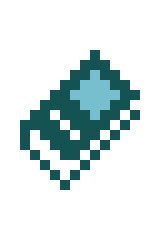On the Origins and Nature of the Dark Calculus: Difference between revisions
m (Quote break revert) |
mNo edit summary |
||
| Line 1: | Line 1: | ||
{{stub}} | {{stub}} {{As Of Patch | 2.0.182.0}} | ||
{{Item | {{Item | ||
| title = {{Color | W | On the Origins and Nature of the Dark Calculus}} | | title = {{Color | W | On the Origins and Nature of the Dark Calculus}} | ||
| Line 12: | Line 12: | ||
== Contents == | == Contents == | ||
{{ | {{Book Page|&CEditor's note: this excerpt is published with permission from the notes of Barathrum the Old. | ||
There's evidence in the arithmetic record that the study of formal systems reached a pernicious apex in the Long Before. Advancements made by mathematicians such as Russell, Gödel, Eisencruft, Atufu, Wheatgrass, and System Star contributed to the understanding of notions like undecidability, pointed regularism, and abyssalism. Upon reaching this minimal degree of mathematical maturity, equipped with sophisticated grammars, researchers set out to experiment with the limits of expressibility. They contrived bold research programs and galloped into the mathematical wood, unwitting of the dangers that brood there. | There's evidence in the arithmetic record that the study of formal systems reached a pernicious apex in the Long Before. Advancements made by mathematicians such as Russell, Gödel, Eisencruft, Atufu, Wheatgrass, and System Star contributed to the understanding of notions like undecidability, pointed regularism, and abyssalism. Upon reaching this minimal degree of mathematical maturity, equipped with sophisticated grammars, researchers set out to experiment with the limits of expressibility. They contrived bold research programs and galloped into the mathematical wood, unwitting of the dangers that brood there. | ||
Revision as of 20:19, 22 June 2019
| This article is a stub. You can help Caves of Qud Wiki by expanding it. |
| This information is reliable as of patch 2.0.182.0. If this is no longer the current patch, you can help by updating it. |
|
| |
ID?
|
DarkCalculus |
|---|---|
Book ID
|
DarkCalculus |
- cfc041;"> On the Origins and Nature of the Dark Calculus
A sheaf of lined, blue paper sewn together with silk thread.
On the Origins and Nature of the Dark Calculus is a book.
Contents
Editor's note: this excerpt is published with permission from the notes of Barathrum the Old.
There's evidence in the arithmetic record that the study of formal systems reached a pernicious apex in the Long Before. Advancements made by mathematicians such as Russell, Gödel, Eisencruft, Atufu, Wheatgrass, and System Star contributed to the understanding of notions like undecidability, pointed regularism, and abyssalism. Upon reaching this minimal degree of mathematical maturity, equipped with sophisticated grammars, researchers set out to experiment with the limits of expressibility. They contrived bold research programs and galloped into the mathematical wood, unwitting of the dangers that brood there.
The record is even scarcer than usual, due to the efforts of successive generations to obfuscate the venture. As best as I can gather, at some point in the course of inquiry, a theorist from a mathematical seminary called the Cupola formulated a conjecture on the fragility of formal semantics. The conjecture ripened to a broader theory, out of which spawned a formal system called the penumbra calculus. In the few fragments of texts that predate the obfuscation, it's stated that, in the penumbra calculus, certain theorems are provable, but are falsified upon the completion of their proofs. As much as this result is at odds with the systems of thought I've encountered in my own inquiries, I find little reason to doubt the veracity of the authors. Nevertheless, it's certainly a peculiar property.
The Cupola theorist's results erupted into a grand investigation into the expressibility of the penumbra calculus. The conclusions were troubling. Pushing further, researchers constructed sister systems with alternate axioms. These systems were still more fragile, with the systems' inference rules themselves unraveling upon the completion of certain proofs.
Convinced that their discoveries were made possible by some idiosyncrasy of self-awareness, but synchronously fearful of the implications of their results, some schools of theorists engineered complex automated deduction systems to probe boundary theorems and launched them into neutron stars. The outcome is undocumented, but the result convinced theorists across the Coven to abandon research and blacklist anyone who studied the penumbra calculus and its derivative systems.
Peculiarly, support for the injunction was unanimous. Of note, even the spacefolder Ptoh agreed to abandon its investigation into the forbidden calculi from the reaches of its bleak star. Though the manner of its consent was not without controversy; to announce its accord, it inverted the color charge of quarks in a small region of space, causing a research station to collapse in on itself. Nonetheless, Ptoh's consent is testament to the degree of existential anxiety that could cause investigation into the penumbra calculus to go dark.
